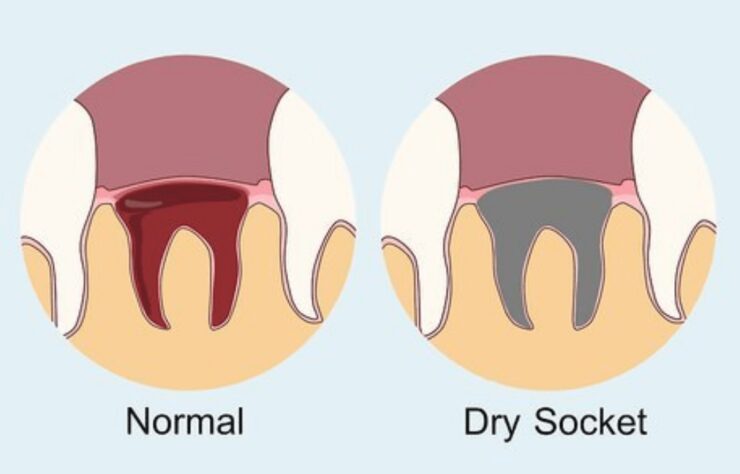Nowadays, nobody shared your weight loss plans.Are you looking no nonsense weight loss ? You can read article.
A dry socket can be extremely painful and for most Dentists, it is one of the main points of the topic after tooth extraction. Your dentists will undoubtedly know much about the associated pain with a dry socket, also known as (alveolar osteitis). As such, he or she will do their best to educate you on the optimal methods to prevent a dry socket.
Dry sockets are actually very common after an adult tooth has been extracted. Especially when it is a third molar (Wisdom Tooth) or when it is an impacted wisdom tooth. There are 4 ways that a wisdom tooth can grow, so not all of them are regarded as an impacted wisdom tooth. Below is an image of the 4 ways a wisdom tooth could grow.
Additionally, wisdom teeth aren’t the only ones that can turn into a dry socket. Any tooth extracted, leaves a cavity in the exposed area that has the potential to become a dry socket. This is especially the case if it is not cared for correctly.
Causes of a Dry Socket
There are a few ways a dry socket could develop. However, in general, a dry socket develops when you undertake actions that cause the pool of blood clotting to be removed. After a tooth is extracted, the blood begins to pool in the opened cavity. This blood clot then begins to cover the exposed area, which at the time provides access to the jawbone. This is one benefit of this natural process; it helps seal the wound.
Another benefit of this process is that it begins to lay the foundation for what the socket will need in order to heal over the following week. Just like a cut or a wound in any other part of the body, the scab develops, which helps cover the wound and allows for the affected area to heal. Similarly, the pool of blood clots in the affected area is doing the same job. However, what happens when it doesn’t work as planned?
Below are some reasons that could cause a dry socket.
- If you rinse your mouth too much during the first 7 days, you could remove the clot by doing so and expose the bone to harsh conditions, which will cause massive pain.
- If you drink out of straw during your first 7 days, you could dislodge the blood clot from the desired position and rapidly begin to sense the pain.
- If you smoke or drink after a tooth extraction, you could potentially dislodge the blood clot by sucking it out of its position.
- Improper preventative measures such as basic oral care could cause the removal of the clot as well leaving you with the same results.
In order to avoid this, do the best you can by following your dentist’s recommendations to the letter. While a dry socket may not be the end of the world, it will feel like the end of the next 7days. Avoid hot foods or any kind, eat cold items, and do not use alcohol-based mouthwash. Your dentist will have an ideal prescribed mouthwash without alcohol, that you can use instead.
Symptoms to Avoid
Unfortunately, once the deed is done, you have no choice but the endure the pain. Your dentist will be able to provide you with both antibiotics to help the inflammation and reduction of bacteria. As well as pain relievers or pain killers that will get you back to your day-to-day routine.
However, if you do not make use of these prescriptions, here are some of the symptoms you can expect to experience.
- Severe pain within a few days
- Visible empty dry socket
- Visible bone in the socket
- Radiating pain through your muscles and nerves
- Unpleasant sense of taste in the mouth
- Unpleasant odor emanating from the exposed bone.
By this point you will just have to ride it out with the options your dentist has given you. However, if you begin to notice any sort of swelling or infection in the affected area, you should do your best to see your dentist right away. If your dentist is not available, look for an emergency dentist near your area.
Prevention
There are some areas you can be more conscious about that can help prevent some of these causes and symptoms. Focus on a dentist that is reputable and that has ample experience in tooth extractions.
Do your best to stop smoking before and after the tooth extraction date. If you prepare your mind and body for the procedure, you won’t be as tempted to smoke or drink after the procedure.
Follow your Doctor’s post-surgery recommendations to the letter so that you may improve your odds. Furthermore, don’t brush your teeth the way you would any other day. That’s if you’re the rough brushing type. Be gentle with your mouth, especially while you are healing.
Take some of these into consideration and do your best to follow your dental orders and you’ll turn out just fine at the end of the day. Then you can think more about dental implants if need be.




























